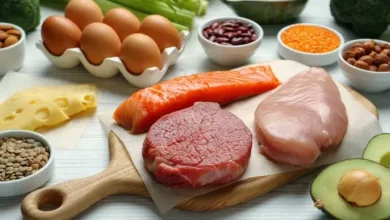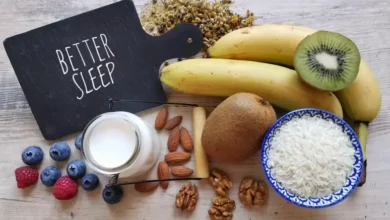Simple Swaps to Make Any Meal Healthier
Healthy eating doesn’t have to mean giving up your favorite foods. In fact, small changes can make a big difference—especially when those changes become habits.
By making simple ingredient swaps, you can boost nutrition, reduce calories, and enjoy your meals without sacrificing flavor or satisfaction. These tweaks work for breakfast, lunch, dinner, and snacks—and they’re easy to apply whether you cook at home or eat out.
Let’s explore practical, smart swaps you can start using today to make any meal healthier.
Why Small Swaps Matter
Tiny changes add up over time. Swapping out just one ingredient can help you:
- Reduce added sugars, sodium, and unhealthy fats
- Increase fiber, vitamins, and minerals
- Improve digestion and energy levels
- Support weight and blood sugar management
- Maintain a healthy relationship with food
And best of all? You still get to enjoy the meals you love.
Smart Swaps for Breakfast
Instead of: Sugary cereal
Try: Rolled oats with fresh fruit and nuts
Benefit: Less sugar, more fiber and protein to keep you full
Instead of: Flavored yogurt
Try: Plain Greek yogurt with berries and a drizzle of honey
Benefit: Lower sugar, higher protein and probiotics
Instead of: White toast with butter
Try: Whole grain toast with avocado or nut butter
Benefit: More fiber, healthy fats, and better digestion
Instead of: Store-bought muffins
Try: Homemade banana-oat muffins sweetened with dates
Benefit: No refined sugar, higher fiber, and nutrient-rich
Smarter Choices for Lunch
Instead of: White rice or white bread
Try: Brown rice, quinoa, or whole grain bread
Benefit: More nutrients, longer-lasting energy, and lower glycemic impact
Instead of: Processed deli meats
Try: Grilled chicken, tuna, tofu, or hard-boiled eggs
Benefit: Fewer additives and preservatives, more clean protein
Instead of: Mayonnaise or creamy dressings
Try: Hummus, mashed avocado, or olive oil and lemon
Benefit: Heart-healthy fats and extra nutrients
Instead of: Chips on the side
Try: Sliced veggies, a piece of fruit, or roasted chickpeas
Benefit: More fiber, fewer empty calories
Dinner Swaps That Work
Instead of: Deep-fried protein (chicken, fish)
Try: Grilled, baked, or air-fried versions
Benefit: Less oil and saturated fat, same great taste
Instead of: Heavy cream sauces
Try: Tomato-based sauces or Greek yogurt-based dressings
Benefit: Lower calories and fat, more protein
Instead of: Large portions of meat
Try: Half meat, half plant-based protein (like beans or lentils)
Benefit: Boosts fiber and reduces saturated fat
Instead of: Mashed potatoes with butter
Try: Mashed cauliflower with garlic and olive oil
Benefit: Lower in carbs and calories, high in nutrients
Smart Swaps for Snacking
Instead of: Candy or cookies
Try: Dark chocolate with almonds or fruit slices with nut butter
Benefit: Natural sweetness, healthy fats, and more satisfaction
Instead of: Flavored chips
Try: Air-popped popcorn with herbs or baked veggie chips
Benefit: Lower fat, fewer additives
Instead of: Ice cream
Try: Frozen banana “nice cream” or Greek yogurt with fruit
Benefit: Fewer added sugars, more protein and fiber
Instead of: Granola bars with long ingredient lists
Try: DIY energy bites with oats, nut butter, and honey
Benefit: Whole ingredients you control
Beverage Upgrades
Instead of: Soda or sugary drinks
Try: Sparkling water with lemon or fruit slices
Benefit: No added sugar, still refreshing
Instead of: Bottled smoothies
Try: Homemade smoothie with greens, banana, and chia seeds
Benefit: Lower sugar, higher fiber and nutrients
Instead of: Creamy lattes
Try: Coffee with plant-based milk or cinnamon
Benefit: Fewer calories, no added syrups
Cooking & Baking Swaps
Instead of: White flour
Try: Whole wheat, almond, or oat flour
Instead of: Butter
Try: Mashed banana, applesauce, or avocado
Instead of: Sugar
Try: Dates, honey, or maple syrup (in moderation)
Instead of: Table salt
Try: Herbs, garlic, lemon juice, or nutritional yeast for flavor
Mindful Meal Assembly
As you build your meals, aim for:
- Half your plate filled with vegetables
- A quarter with lean protein
- A quarter with whole grains or complex carbs
- A small serving of healthy fat (like nuts, seeds, or olive oil)
This simple balance makes every meal more satisfying and nutritionally complete.
Final Thoughts: Healthier Doesn’t Mean Hard
You don’t need to give up flavor or enjoyment to eat better. By using these simple swaps, you can make your favorite meals healthier without feeling restricted.
Start with one or two changes that feel doable, then build from there. Over time, these small decisions become habits—and those habits lead to lasting results.
Healthy eating is a journey, and it doesn’t have to be perfect. Just a little smarter, one bite at a time.

Hello! My name is Alan Teixeira and I am passionate about helping people live healthier, more balanced lives. From mindful eating to daily habits that promote physical and mental well-being, I believe that small, consistent changes can lead to powerful transformations.
I created this blog to share practical tips, reliable information, and thoughtful insights that can inspire you to take better care of yourself—with balance, mindfulness, and positivity.
If you are looking to improve your health, nourish your body, and build a lighter, more fulfilling routine, you are in the right place. Welcome!





